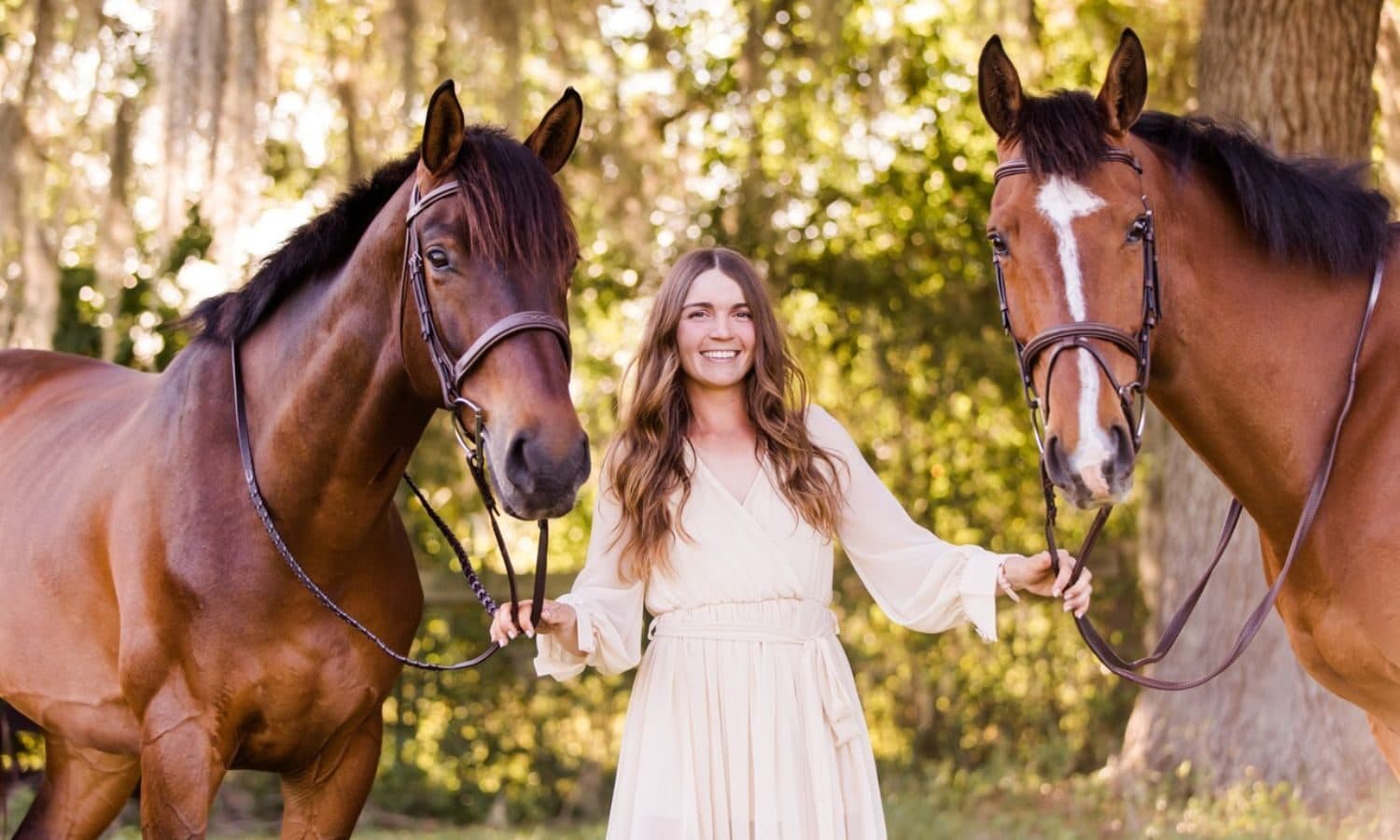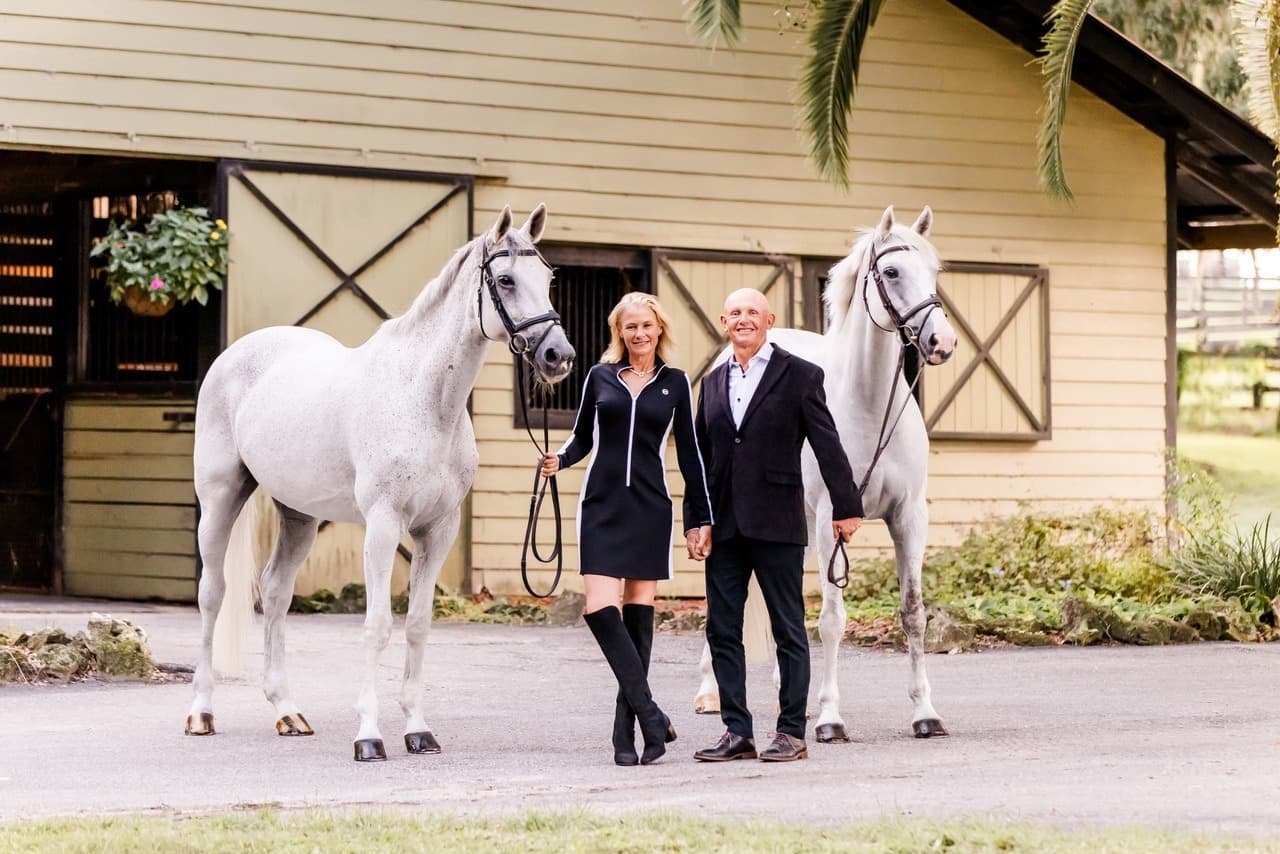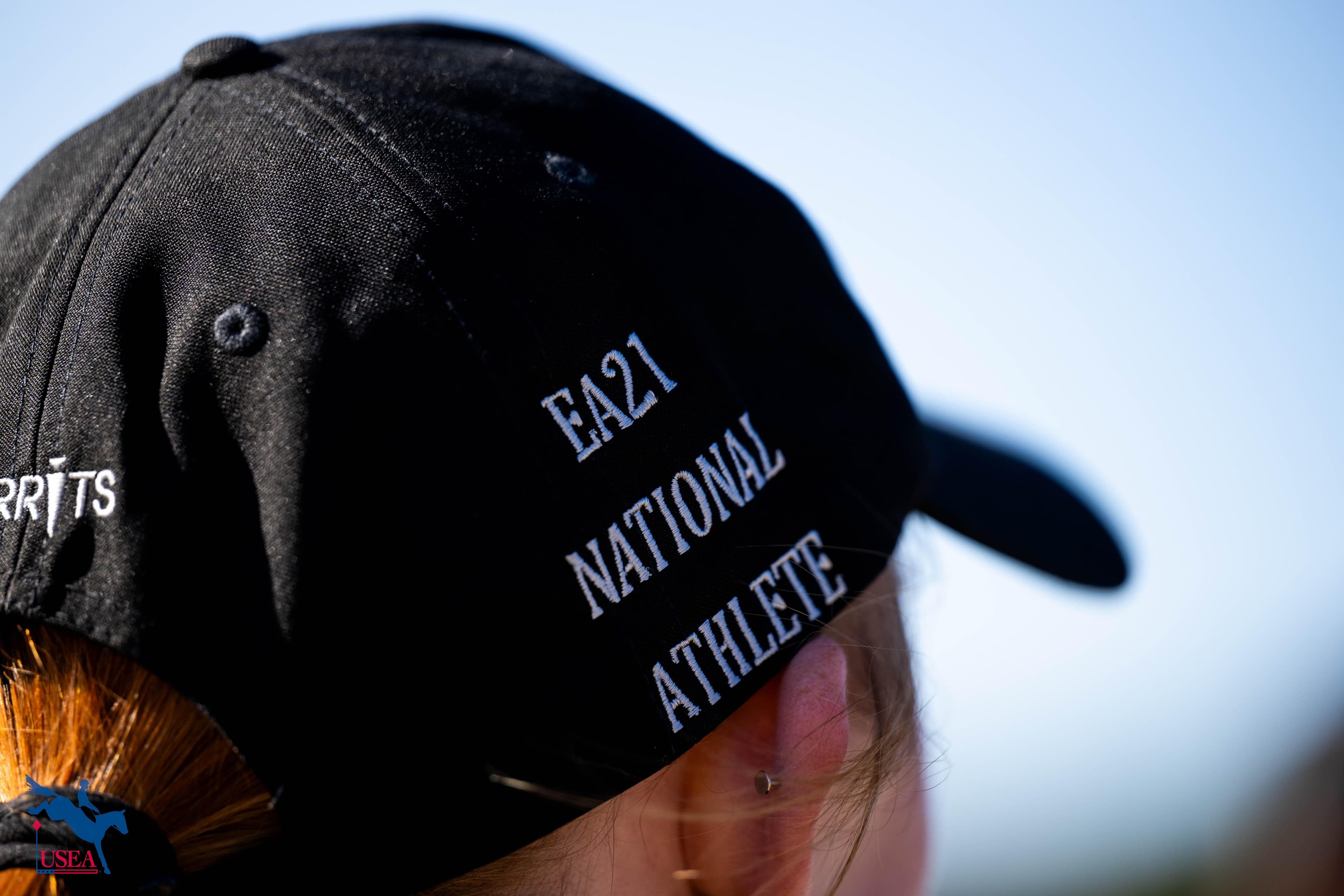Gaby Ruane: Hooked on Horses

This article originally appeared on sidelinesmagazine.com.
Breathtaking beaches, sparkling water, tropical flowers and Haleakalā National Park: When most people think of Maui, that’s what comes to mind. That’s not the case for Gaby Ruane. For Gaby, Maui is the place where she realized she wanted to become an equestrian professional.
When Gaby was 6 years old, her parents signed her up for a week-long horseback riding camp not far from where they lived in Western Springs, Illinois. “I was immediately hooked! Not long after, our family moved to Maui, Hawaii, and that was where I got into a weekly riding lesson program,” she said.
Those weekly lessons quickly evolved into Gaby riding five days a week and showing leased ponies. “It may come as a surprise to some, but there was an active horse show circuit on the island. I competed in hunters, jumpers, equitation, Western pleasure and even got to play in a polo tournament,” Gaby said. “I was very fortunate to have had the opportunity to become a well-rounded horsewoman at such a young age, especially in a place as beautiful as Hawaii.”
Gaby’s interest in horses wasn’t limited to her time in the saddle. “I began to devour anything horse-related that I could get my hands on. I would read the same books day after day, learning about careers in the equine industry. By age 6 or 7, I’d made up my mind that I was going to train horses when I grew up,” she said. Today, Gaby runs her own Ruane Eventing in Reddick, Florida.
Canadian Change
Just before her 13th birthday, Gaby moved with her family from Hawaii to Alberta, Canada. While the hunter-jumper opportunities were plentiful on the island, that wasn’t the case where Gaby moved in Canada. “When we moved to Canada, I never had any intention of switching from hunter-jumper to eventing. However, the facility that was closest to where we lived mainly focused on eventing,” Gaby said. “I was interested in learning about the sport, as I had never been exposed to it before. Even riding in a dressage saddle was foreign to me!”
Although being an eventer wasn’t part of Gaby’s equestrian plan, she stayed committed to her dreams of one day becoming a professional trainer. “What eventually drew me into the sport was how much fun everyone seemed to be having when they went cross-country,” she said.
After being a hunter-jumper competitor for several years, Gaby took a little time to embrace the ‘three phases equals the shot at one ribbon’ mentality of eventing. “It was difficult not having the ability to just go in for another round if things didn’t go to plan,” Gaby said. “Especially as a kid, wanting to collect as many ribbons as possible, eventing taught me patience and discipline, and instilled a love of the process rather than instant gratification. I grew to love the challenge of the three phases individually and appreciated the difficulty of having to perform in each one to be competitive.”
For Gaby’s 13th birthday, she received a 6-year-old Thoroughbred, Benevolent, aka Ben. Thanks to this spooky and stubborn horse, Gaby learned how to be patient and trust the process. “Getting eliminated at our first horse trial at the second fence on cross-country wasn’t a highlight of our partnership, but we finished the course—without getting pulled up, somehow!—and proved to ourselves that we could do it,” Gaby said.
When Ben was feeling brave, Gaby had the best time riding him and they had many great experiences together at the lower levels. “He wasn’t the fanciest or the bravest, but he was the horse that I had, and I learned how to make him feel invincible. Plenty of schooling opportunities, good instruction and a little bit of determination was our recipe for eventual success,” she said, “—that and being OK with the fact that our definition of ‘success’ might differ from someone else’s.”
It was through those early eventing years with Ben that Gaby began to appreciate and love the sport. “As I moved up the levels over the years, it became an addiction of sorts. Especially the cross-country. There is nothing quite like the feeling of crossing the finish line after tackling a big track, your horse confident and ready to go again,” she said.

Working Student
Gaby was a working student for Canadian Olympian Sandra Donnelly from 2011 to 2013 and for Jon and Jenn Holling from 2014 to 2020. “This desire to become a professional was the catalyst to my working student career. I wanted to be fully immersed in the industry, soaking up as much knowledge as I could before starting my own business,” Gaby said. “I’m able to have the horses, clients and business that I have today because of my experiences as a working student.
“Sandra, Jon and Jenn all instilled in me an unrelenting commitment to the horses, especially managing all aspects of their care. Everything from feeding to preventive maintenance and veterinary care, to fitness and aftercare,” Gaby continued. “All keys to long-term success that I certainly would not have learned, or been able to apply, to my own program if I hadn’t been so heavily immersed in their programs.”
While working for Sandra, Gaby had her first taste of competing at the upper levels with her mare Tinsel Town. A former show jumper, Tinsel Town competed with Gaby up to the Preliminary level before an injury forced the mare to retire from eventing.
Gaby moved to Ocala, Florida, in 2014 to become a working student for Jon and Jenn. During her time with them, she steadily moved up the ranks, eventually taking on the role of assistant trainer and rider. With Jon and Jenn’s help, Gaby went from never competing above the Preliminary level to producing her own horse, Lismakeera Brewski, or Carlo, through the four-star level.
In 2016, 6-year-old Carlo came to the Hollings’ barn as a sale horse. With extra time on her hands, as her own horse was sidelined with an injury, Gaby was able to do all of the riding with him. After a few months of putting in rides on him, Gaby’s parents offered to buy Carlo for her.
“Our partnership started off with a bang, winning our first event together. From there, and with Jon and Jenn’s guidance, we sailed through the levels, completing our first CCI2* in 2017, CCI3* in 2018, and CCI4* in 2019,” she said. “All of this after he spent months on death’s doorstep in 2017, with a mystery illness that stumped the best vets in the country.”
Each time Gaby moved Carlo, a plain and unassuming horse, up to the next level, she wondered if he would excel at it. “The dressage judges tended to like him, but the show jumping was his Achilles’ heel. He tried his heart out, though, and always wanted to do the right thing,” Gaby said. “The cross-country was where he truly shined; he loved it. He looked for the flags in the way that you can’t train a horse to do, they just have to want to.”
While competing at Chatt Hills in 2020, Carlo had a textbook example of his will to go cross-country. The duo was having a fantastic run until they got to one of the final combinations. “Carlo took a peek as he was jumping the hanging log and subsequently caught his knee on the fence. This pitched me out of the tack, but he stayed upright and continued down the hill to jump the skinny brush fence without me,” Gaby chuckled.

Ruane Eventing
In 2020, after nine years of absorbing all the knowledge she could from Sandra, Jon and Jenn, Gaby decided it was time to branch out on her own and see what she could do. “I was excited to start my own program, taking the best bits from the ones that I’d spent so much time working in, and bring on my own clients, as well as owners for future upper-level prospects,” Gaby said.
Since starting Ruane Eventing, Gaby has produced two more horses to the Intermediate/three-star level. Gaby has found her niche in developing young horses and helping find which job best suits each horse. “I really enjoy the young horses because they learn so quickly, and I love all of the ‘firsts’ that we get to experience. It’s so rewarding to feel the horses understand what you’re teaching them, and to see them grow in confidence,” Gaby said.
As eventing is Gaby’s primary discipline, that’s the discipline all her horses start out doing. “They typically go cross-country for their first off-property outing, and usually on a line in a rope halter. That way they can figure out where to put their feet without me getting in the way,” Gaby said. “Most horses seem to really enjoy it—even doing it with the older, more experienced horses is beneficial—and they can understand what’s being asked of them when you’re ready to try it all under saddle.”
While Gaby has a non-stressful way to introduce horses to cross-country, not all horses take to it. “Maybe they’re too careful, or not careful enough! Then it’s my job to find what they are happiest doing, whether that be show jumping, dressage or something else,” Gaby said. “Figuring out which job will suit a horse is always fun.”
Gaby is currently exploring which discipline suits her best. “I love eventing. Not just the sport, but the community as a whole. Recently, however, I felt some of my goals begin to shift towards show jumping. It’s too early to say if I will ever completely make the switch over, but I have begun immersing myself more and more into that world,” she said.
Last year, Gaby’s Intermediate event horse MHS Mufasa had a hard fall at the end of his first three-star cross-country outing. While Gaby initially thought it would just be a bump in the road that time, patience and training could resolve, that wasn’t the case. Mufasa’s confidence on the cross-country field was shattered after that incident. “He’s always been a fantastic show jumper, so I thought going that route with him seemed to be a no brainer,” she said.
In an effort to help Mufasa find his next act, Gaby connected with Ocala-based hunter-jumper trainer Will Baker. “Will has been helping me bridge the gap between eventing show jumping and pure show jumping for nearly a year now,” Gaby said. “Mufasa and I had a blast competing at WEC this past winter with his help. While there were plenty of learning moments, I finished up the circuit with a new level of respect for show jumping, and fresh goals to go along with that.”
While Gaby’s goals are up in the air at the moment, she knows that whatever path she travels, she wants to keep producing horses. It’s just a matter of whether she will one day find her five-star or Grand Prix superstar. Either way, she feels fortunate to be able to explore her options from her home base in Florida. “In my opinion, I’m in one of the best places in the world to be able to immerse myself in the sport, build the best support team and, as a young professional, find clients and owners who believe in me and can help launch my career,” Gaby said.














